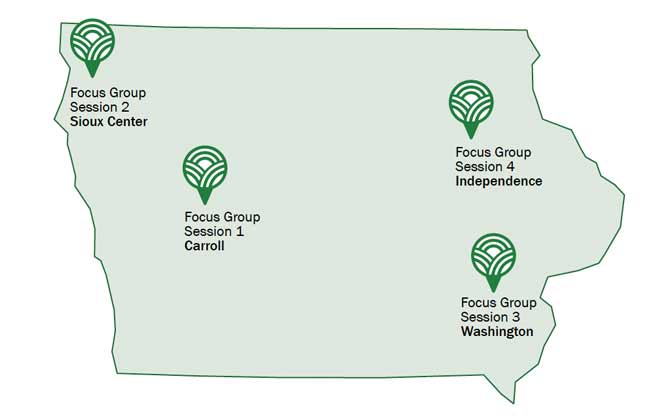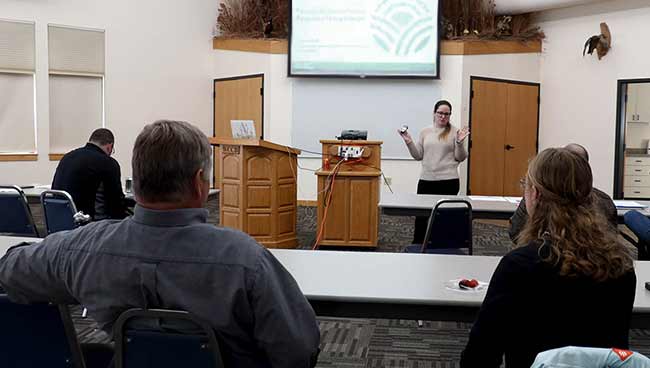As agriculture in Iowa has changed and grown, and concerns surrounding a global animal health incident have increased, the Iowa Department of Agriculture and Land Stewardship (IDALS) has made a concerted effort to ensure that both Iowa producers and veterinarians are informed regarding current state processes to deal with a foreign animal disease (FAD) outbreak. The economic impact of a foreign animal disease outbreak, such as foot and mouth disease, in the United States has been estimated at $14 billion — roughly 9.5% of U.S. farm income. From the cost to eradicate, to the loss of export markets and the restricted movement of animals, the potential impact paints a grim picture and underscores the importance of prevention, early detection, and rapid response. Despite the data highlighting the value and importance of preparedness, it has been challenging to engage producers in outreach activities and programming around the topic of emergency preparedness and response. In 2021, the Iowa Department of Agriculture and Land Stewardship introduced the focus group initiative with the goal of leveraging sessions to determine statewide producers’: (a) awareness of FAD threats, response plans, and opportunities to minimize operational and supply chain disruptions if an outbreak occurs; (b) current level of FAD preparedness; (c) expectations of roles and responsibilities during an outbreak, and (d) needs to better prepare for an outbreak and how IDALS can help address those needs.
The project was a six-month effort that involved a collaborative partnership between IDALS and the Center for Educational Technologies (CET). IDALS and CET staff worked together to develop the focus group questions and determine where the focus group sessions would be delivered around the state. The Emergency Management Coordinator at IDALS served as the subject matter expert and presenter for the state/department’s emergency response plan content. They also worked closely with Dr. Molly Gonzales at the CET to develop targeted focus group questions that spoke to the project initiatives. Over 85 individuals registered for the focus groups that were held around the state in Carroll, Sioux Center, Washington, and Independence.

Each species-specific focus group session lasted two hours, with three sessions being held each day. The sessions were held across four locations around Iowa: Carroll, Sioux Center, Washington, and Independence. Participants were asked to introduce themselves to the group as each session opened. Introductions were followed by a short video presentation highlighting new stories and reports covering outbreaks both past and present. With the video setting the foundation and tone for the rest of the conversation, focus group questions were sandwiched between presentations by the Emergency Management Coordinator of IDALS, who shared the state/department’s response plan and expanded the discussion on the impact of outbreaks. The content presented served as supplemental information to further equip participants to respond to the questions being asked. After completion of each focus group session, the focus group recording was uploaded and saved.
The Stakeholder Focus Groups spanned a period of two weeks, beginning with the first focus group session on January 12, 2022, and ending with the final focus group on January 19, 2022. The project team collected over 18 hours of audio recordings from across the four locations.

The Iowa Foreign Animal Disease Preparedness Stakeholder Focus Groups Program was valuable in collecting stakeholder data regarding participants’ feelings of preparedness and concerns regarding foreign animal disease and the emergency response process. These focus group sessions offered an opportunity for all participants to candidly ask questions, share concerns, and network with other regional stakeholders that work with their same species. The views and perspectives shared highlight key areas where more knowledge and resources would be welcomed to alleviate misconceptions or concern. The sessions also exposed participating producers, veterinarians, and industry leaders to the state’s emergency response plan. Once participants were made aware of the state’s plan, they were given time to ask questions regarding the response plan. With all of the data collected and gathered, the Iowa Department of Agriculture and Land Stewardship will have the information necessary to make informed decisions regarding the development of new materials, trainings, and future programming.